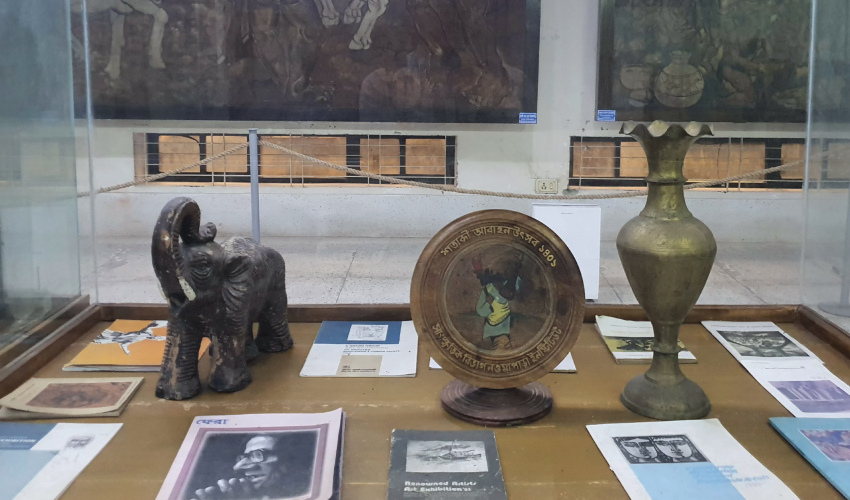Exploring SM Sultan’s legacy along the Chitra river
By Neha Shamim
On the banks of the revered Chitra River in Narail, Bangladesh, stands the SM Sultan Memorial Museum, a testament to the life and work of SM Sultan, a distinguished artist whose legacy transcends generations. Known for his introspective, reclusive nature, Sultan dedicated his life to capturing the spirit of rural Bengal and fostering a love for art among children. In Rupganj, Narail Sadar, the “Sultan Complex” preserves his memory, welcoming visitors to explore his world of art, simplicity, and an enduring love for his homeland.
Born into modest circumstances, Sultan was encouraged by his father, a mason, to nurture his talent for drawing, which eventually led him to enroll at Calcutta’s Government Art School. However, his unconventional and free-spirited outlook made formal education feel confining. He ultimately decided to leave and embark on a journey across India, immersing himself in diverse cultural experiences. Through these travels, he developed a unique artistic style that later set him apart from his peers.
The Sultan Complex, managed by the Ministry of Cultural Affairs, is an immersive tribute to the artist. Entering the complex, visitors are greeted by lush gardens adorned with colorful blooms, leading to Sultan’s mausoleum on the left. To the right stands his original residence, a part of which remains intact. Behind this, the main museum, housed in a two-story building, displays Sultan’s art and personal belongings, encapsulating his life’s essence and artistry. The heart of Sultan’s legacy lies in his love for teaching art to children. In the abandoned mansion of a former zamindar, Sultan established Shishu Swargo (Children’s Paradise), a vibrant school where nearly 150 students today learn painting under the guidance of two experienced instructors. Shishu Swargo’s walls are lined with children’s artwork, bringing to life images of village life, nature, and festivities. In red letters on the right wall of the entrance veranda, Sultan’s words echo: “A child who paints beautifully, paints their village, paints flowers, paints animals, paints trees, cannot commit a crime, cannot hurt anyone. ”Inside the museum, an auditorium houses a beautiful array of children’s drawings, from rivers and trees to scenes of village life. One child, inspired by Sultan’s legacy, painted a birthday celebration for him, capturing the joy of the occasion with the caption “Our joy on Sultan’s birthday.”
Tandra Mukherjee, the museum curator, shared insights into the collection, which includes 23 original paintings by Sultan and replicas of other significant works, which are carefully printed on canvas and framed. Sultan’s bedroom is preserved with his bed, closet, personal belongings, and musical instruments such as his flute and harmonium, all meticulously maintained for 28 years. Mukherjee expressed the need for larger exhibition space to display Sultan’s monumental canvases appropriately, noting that advanced preservation technology could ensure these artworks endure for future generations to admire.
Sultan’s life was marked by a quiet, profound connection to nature and simplicity. After traveling the world, he returned to his village in Narail, embracing a life of artistic dedication. Sultan spent his days painting, spending time with animals, and nurturing young artists. He even built a large barge, moored on the Chitra River, as a floating classroom for children to experience the magic of art on the water. However, efforts to maintain the Sultan Ghat, where the barge remains, have stalled, and Mukherjee called for support to preserve this unique piece of Sultan’s legacy
Each year, the Narail District Administration and the SM Sultan Foundation organize the Sultan Fair in his honor. In 2023, the fair was held from January 7 to January 20, rescheduled to avoid the monsoon rains. The 14-day fair featured discussions on Sultan’s life and work, art exhibitions, and traditional village games, including boat races and stick-fighting competitions. Sultan Award presentations were held, celebrating Sultan’s enduring impact on art and culture.
The museum remains open to visitors from 10am to 4pm every day except Sundays, attracting domestic and international tourists eager to experience Sultan’s artwork. Golap Kazi, a dedicated caretaker of 19 years, oversees the museum, welcoming visitors from near and far. Though the museum’s staff does not receive a formal government salary, they serve with dedication, supported by a modest honorarium. The Sultan Complex, currently under the care of the Bangladesh Shilpakala Academy, stands as a tribute to the artist who lived simply yet profoundly, inspiring countless generations through his vision and devotion to art.
Visiting the SM Sultan Memorial Museum is more than an exploration of art; it is a step into the life and legacy of an artist who celebrated the beauty and strength of rural Bangladeshi life. Walking through the halls adorned with Sultan’s powerful paintings and surrounded by the gentle flow of the Chitra River, visitors can feel a connection to his deep admiration for the resilience of his homeland’s people. His work captures both simplicity and majesty, where each canvas becomes a tribute to the harmony between humans and nature, showcasing the agrarian life Sultan cherished.
In the museum, you can explore not only Sultan’s artwork but also personal artifacts that bring his personality to life: his musical instruments, clothing, and the rustic furniture he used. Each item adds depth to understanding Sultan’s world – one of a visionary who remained humble, choosing to live in quiet dedication to his community even after achieving national acclaim. The museum also preserves Sultan’s “Shishu Swargo” initiative, a children’s paradise he established to foster creativity and instill values of compassion and self-expression in young minds. This project reflects his belief that art could inspire moral integrity, shaping a more empathetic society.
For those seeking a unique travel experience, the SM Sultan Memorial Museum in Narail offers a journey into the creative spirit that saw art not merely as self-expression but as a way to uplift society and honor tradition. The annual Sultan Fair, held near the museum, adds to the vibrant cultural experience, featuring exhibitions, traditional games, and discussions about Sultan’s legacy. Whether you are an art enthusiast, a history lover, or someone inspired by cultural heritage, a visit to Narail promises a memorable experience, inviting you to dive into the remarkable mind of SM Sultan and leave with a lasting appreciation for his vision. This journey into Sultan’s world of art and philosophy is one that resonates well beyond the museum walls, offering reflections on simplicity, resilience, and the timeless beauty of human connection to nature.
Neha Shamim
- Neha Shamim#molongui-disabled-link
- Neha Shamim#molongui-disabled-link
- Neha Shamim#molongui-disabled-link
- Neha Shamim#molongui-disabled-link













